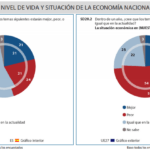Parliament warned on Wednesday about the impact of recovery costs on the bloc’s 2024 budget, putting the bloc’s main plans at risk.
MEPs are “deeply concerned that, if the necessary measures are not taken, the cost of increased funding for European recovery instruments could severely constrain the EU budget in terms of financing EU priorities and policies and meeting new needs”.
Interest rates higher than predicted in 2020
The 2021-2027 multiannual financial framework (MFF) budgeted for €12.9 billion in 2018 prices (€15 billion in current prices) over the seven-year period to cover the borrowing costs for the EURI. This figure was based on an assumption that interest rates would gradually increase from 0.55% in 2021 to 1.15% in 2027- but they already now stand at over 3%.
Consequences for flagship EU programmes like Erasmus+
If no action is taken, programmes such as Erasmus+, EU4Health, the citizenship, equality, rights and values programme, Creative Europe and others are likely to face cuts, while high inflation is reducing the real-term value of the whole EU budget, MEPs say.
Extra resources normally available are already exhausted as a result of multiple crises such as Russia’s war of aggression against Ukraine and the COVID-19 pandemic. Without a swift and decisive response, it will be “all but impossible to finance important new initiatives, such as the proposed European chips act, without cutting essential existing programmes or funds”, the text stresses.

European Commission raises EUR 9 billion in new issue for recovery fund and Ukraine |
Need for urgent reform of EU finances
MEPs call for an “urgent and ambitious MFF revision” with the “necessary architecture and financing to manage EURI repayment costs effectively, while preserving the necessary levels of funding for programmes and policies”, ensuring that the EU can also cope with future needs and respond to crises. Such a revised MFF “must be in place by 1 January 2024”. In addition, they call for the introduction of new own resources according to the legally binding roadmap, in order “to ensure a reliable and sufficient overall level of additional revenue, including to cover EURI borrowing costs.”
The resolution by rapporteur Johan Van Overtveldt (ECR, BE), Chair of the Committee on Budgets, was adopted on Wednesday by 434 votes against 99 and 89 abstentions.
Watch the rapporteur’s plenary speech (08/05/2023)
Next steps
The Commission is expected to table the 2024 draft annual budget at the end of May and propose a review or revision of the MFF in June, as well as a new batch of EU income streams still in 2023.
Background
In 2021, the Commission started borrowing funds on the financial markets to finance the “NextGenerationEU” recovery instrument. In adopting the MFF, Parliament, Council and the Commission agreed that expenditure covering the financing costs of the recovery instrument should not reduce EU programmes and funds. According to Article 311 TFEU, “the Union must provide itself with the means necessary to attain its objectives and carry through its policies.”
In adopting this resolution, Parliament is responding to citizens’ expectations to strengthen its budget through a system of ‘own resources’ as expressed in Proposal 16 of the conclusions of the Conference on the Future of Europe.







Leave a Reply